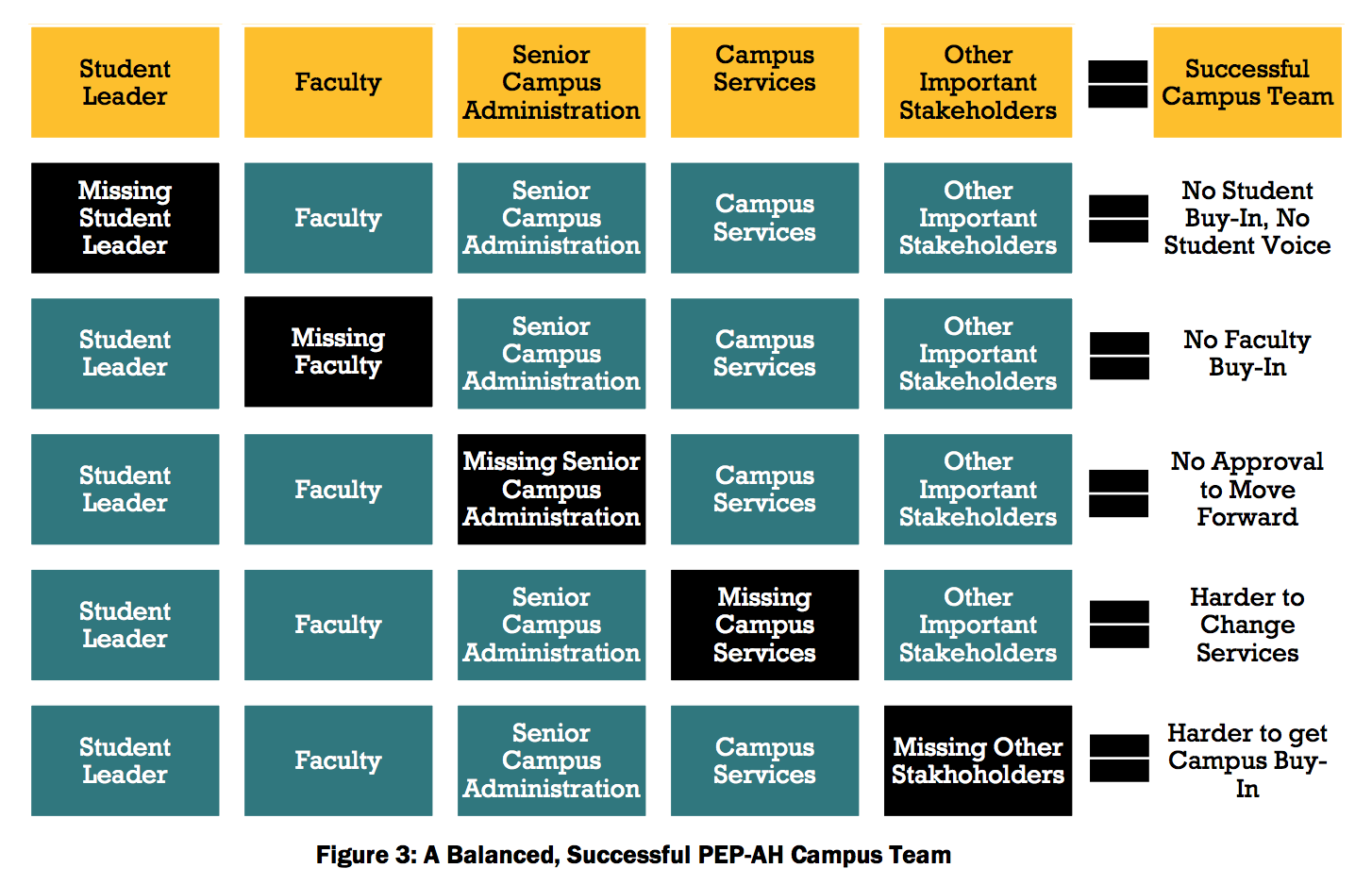ENGAGING A DEDICATED TEAM
INTRODUCTION
Welcome to the Post-Secondary Education Partnership – Alcohol Harms (PEP-AH), an expanding group of universities and colleges from across Canada, together with the Canadian Centre on Substance Use and Addiction (CCSA) and Universities Canada. This network supports nation-wide efforts to reduce the harms related to alcohol consumption on campus.
Establishing a PEP-AH Campus Team is essential to reducing alcohol harms on Canadian campuses. A Campus Team is the main point of contact between PEP-AH and campuses. Having diverse perspectives represented on the Campus Team can help you develop an action plan that will work for more students, staff, faculty and other partners. Focused, strong and well-established teams can effectively address the issue of alcohol on campuses: experienced PEP-AH partners have seen very little reduction in alcohol harms without them.
ESTABLISHING A BALANCED MEMBERSHIP
In our experience, successful campus teams have included at least one:
- Student leader
- Faculty member
- Senior campus administration representative (e.g., dean of students, student service director, etc.)
Additionally, we’ve seen even more success when the team has included:
- Campus services representative (e.g., security services and residence life)
- Additional key stakeholders (e.g., health services, campus bar services, recruitment officer, etc.)
Students play an important role in supporting the success of alcohol harm reduction initiatives on campus. Students can extend the perspective of your Campus Team by offering a perspective from diverse cultural backgrounds, from on-campus and off-campus experiences, and with links to other students, student groups and student initiatives. When Campus Teams are more than five members, consider multiple memberships for students to ensure that the student voice informs action.
The optimal mix of members helps Campus Teams make significant progress toward action on their initiatives. A balanced team promotes the following qualities:
Student buy-in and the student voice to help shape your initiatives;
Faculty buy-in for research capacity and understanding of academic culture;
Senior administration approval to move forward;
The ability to enhance campus services; and
Broader support among campus stakeholders.
The lack of members in any area brings the avoidable challenges shown in the figure below. If you cannot have the optimal mix of team members on your PEP-AH Campus Team, think through how you can mitigate their absence by building links with other stakeholder groups.

CLARIFICATION OF TEAM ROLES
Some campus teams have chosen to build a formal structure around their team roles, with a Terms of Reference and very clearly defined roles (e.g., informing, consulting, seeking approval, developing documents, hosting events, etc.). Some teams haven’t developed any formal structure, choosing instead to simply get together and move forward with developing and implementing initiatives. Both formal and informal approaches can be successful. Choosing one approach over the other might depend on a number of factors, including the size of your campus, the mix of skills, experience and capacity on the team, and the size and complexity of the initiatives you have chosen to implement. You might not need to choose a structure right away; some successful teams have formalized their structures as they got started.
CREATING A CORE TEAM & WORKING GROUPS
As you implement your action plan, your team might find it necessary to have smaller working groups dedicated to planning, implementing or evaluating specific initiatives. Work towards clarifying how these working groups stay connected with your core team, and how they move their specific work forward. If your core team has formalized its work through a Terms of Reference or some other mechanism, consider formalizing the role of working groups as well. Working groups are another opportunity to engage diverse students and other stakeholders across your campus. Brainstorm with your group about who would make sense on a working group before you move forward: we have found that early conversations save time later.
In some cases, smaller working groups are a good opportunity to engage students who represent diverse perspectives. These might include, for instance, students with lived experience of problematic substance use, international students, LGBTQ students, commuter students, students living off-campus and students who represent others through their involvement in diverse student organizations and committees. Students should be leaders and partners in this work.
TEAM MEETINGS
Schedule regular meetings to keep the work moving forward on your campus, but be flexible. Your campus, like all PEP-AH partner campuses, has its own rhythm dictated by the start of classes, reading weeks, holidays, exams and summer semesters. In building your Campus Team, look at the calendar as it relates to your campus and move forward accordingly. While it might be tempting to set a recurring meeting for your team and push onwards at all costs, consider the effect on student leaders, faculty and other members of the team who might feel stretched to the limit or are not on campus at given times of the year.
Experienced PEP-AH partners have seen campus teams move forward successfully when they respected the rhythm of their campus and team members. Adjust the frequency and intensity of your meetings to move forward, while balancing the needs of the different team members so that they can stay involved in the work. At some points of the academic year that might mean just staying in the loop. At other points that could mean having a weekly meeting.

BUILDING CAPACITY ON YOUR TEAM
PEP-AH has seen students empowered to innovate on their campus and take on new roles to move forward successfully to reduce alcohol harms. Look for opportunities to empower all members of your team to move forward, to try something new and to stretch their abilities. Your team might realize when they begin an initiative that it needs to shore up particular skills. You might have contacts who can help to build skills, or on-campus training or resources that your team can access. You can build the capacity of your team before you start an initiative or while in the middle of an initiative.
Engagement Tips
- Share key messages about alcohol harms. In your recruiting efforts, share key messages about alcohol harms on your campus ( Communications Resources). Messages about alcohol harms could help attract action-oriented people to the team.
- Engage students through placements and practicums. PEP-AH partners have noted success recruiting students through placements, practicums and co-curricular experiential learning opportunities. These students are often eager and ready to get to work, and have a set amount of time to commit to your Campus Team.
- Food helps bring people together. We have seen successful teams and campus initiatives built, in part, by providing food. A noon meeting is easier for team members to attend when lunch is provided. It also helps bring a social aspect to the work.
- Be flexible. Some team members might be interested in joining a Campus Team, but also engaged in other opportunities and activities. Work with your team and be flexible, so that team members can balance a commitment to PEP-AH with other commitments.
- Use your network. In building your team and planning, implementing and evaluating your work, take advantage of your team’s contacts. Other people on campus can help your team reach out.
- Plan for turnover. As students graduate, faculty move to other campuses and staff take on new opportunities, your Campus Team membership can change. You will need a plan that accounts for turnover. You might consider getting a membership commitment from campus organizations, so that the organizations are linked to your team and can help recruit new representatives.
CONNECTING ACROSS CANADA
As you embark on your work building a PEP-AH Campus Team, we want to emphasize a few points.
- This work is important and you are a crucial part of it.
- Alcohol harms on campuses need to be addressed by dedicated individuals, but no one person can address this issue and improve his or her community alone. Working with others through a strong Campus Team, with the support of others on your campus and of PEP-AH will help you be successful.
- You are not alone.
- PEP-AH has been structured to connect people, and to connect efforts to reduce alcohol harms across campuses. Please reach out to us and other PEP-AH partners.
- Connect with PEP-AH Regional Leads. Your Campus Team is encouraged to reach out to Regional Leads (contact pepah-pepma@ccsa.ca for more details). These leads are available to help you connect with other PEP-AH Campus Teams and to the PEP-AH Advisory Committee.
- Connect with other PEP-AH Campus Teams. If you know of a campus like yours that is doing good work to reduce alcohol harms, reach out to them and start a conversation (see PEP-AH Members).
- Connect with the PEP-AH Advisory Committee. We are happy to help or connect you with someone who can help (pepah-pepma@ccsa.ca). The PEP-AH Advisory Committee holds an annual national PEP-AH meeting so that we can connect in person and hear about your work (see PEP-AH Events)
- Addressing alcohol harms is long-term work.
- Alcohol harms are an ongoing social issue. A Campus Team can take important steps, but it is important to realize up front that, while a successful initiative can help to address alcohol harms, no one initiative solves alcohol harms.







